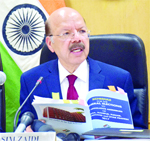NEW DELHI, Jan 4:
Assembly elections in the politically-crucial Uttar Prad-esh, Punjab, Uttarakhand, Goa and Manipur will be held between February 4 and March 8 in what will be the first major test for Prime Minister Narendra Modi’s gamble on demonetisation.
While polling will be spread over seven phases in Uttar Pradesh, it will be a one-day affair in Uttarakhand, Punjab and Goa, and a two-day exercise in Manipur.
Counting of votes will be taken up together in all the states on March 11, the Election Commission announced today setting in process the mega political exercise in the new year.
Announcing the schedule, Chief Election Commissioner Nasim Zaidi said the Commission will keep a watch on the use of black money, which is expected to come down due to demonetisation. Steps will be taken up to ensure that other illegal inducements are not used to influence voters, he said.
In Uttar Pradesh, which has a 403-member House, polls will be held on February 11 (73 constituencies), February 15 (67 constituencies), February 19 (69), February 23 (53), February 27 (52), March 3 (49) and March 8 (40).
Unlike last elections, Manipur, which recently witnessed violence raising questions whether elections would be possible now, will have a two-day polling on March 4 (38 constituencies) and March 8 (22 seats). Here, the Congress seeks to retain power.
Polling will be held in Punjab and Goa together on February 4 and in Uttarakhand it will be held on February 15.
The whole electoral process will begin with the issue of notification for polls in Punjab and Goa on January 11.
The family feud and the split in ruling Samajwadi Party have injected a new dimension in the politics in Uttar Pradesh where BJP hopes to capture power after 14 years on the back of a sweep in Lok Sabha elections in 2014. BSP and Congress, the other main challengers, hope to make it a quadrangular fight but for some alliances being made.
Punjab, which a 117-member assembly, promises to be an essentially three-way fight between the ruling SAD-BJP combine, Congress and the new entrant AAP.
After sensational political developments in Uttarakhand in 2016, where Congress was temporarily dislodged from power due to defections, the party and BJP are set for a virtual direct fight on 70 seats.
In Goa, where BJP seeks to retain most of the 40 Assembly seats to remain in power, AAP is being seen as a new player which plans to topple the applecart of national parties Congress and BJP.
Over 16 crore people will participate in these polls for 690 constituencies in five states, for which the Commission has set up 1.85 lakh polling stations, up 15 per cent from the number during the 2012 polls.
“The Model Code of Conduct will come into immediate effect and will apply on political parties and State Governments concerned, besides the Central Government in terms of announcements in these states,” Zaidi said.
The CEC said candidates will have to open a bank account for all election expenditures and expenses above Rs 20,000 will be made through cheques from the new accounts. He added that donations above Rs 20,000 will also be accepted through cheques.
The maximum limit for expenses for each candidates in Uttar Pradesh, Punjab and Uttarakhand is Rs 28 lakh, while that in Goa and Manipur is Rs 20 lakh, he said.
Responding to a question on poll funding, the CEC said the Commission has already asked the Government to cut down to Rs 2,000 the present Rs 20,000 limit on anonymous donations to parties.
He said as part of reforms, the candidates will have to submit a ‘No-Demand Certificate’ from agencies providing amenities and Government accommodation. The certificate will come from agencies dealing with electricity, water, telephone and also the rent certificate of the government accommodation which these candidates may have occupied in past 10 years.
Defence personnel posted away from their homes constituencies can cast vote through one-way electronic transmission of ballot in the polls. But the facility may not be available in all the constituencies this time and could be extended in a select seats.
The Commission had first experimented the initiative in a Puducherry bypoll recently.
Asked about suggestions that the Commission ‘waited’ for Prime Minister Modi’s Lucknow rally before announcing the poll schedule, Zaidi said the poll panel “has its own mind.”
“It does not make its schedule according to the request of political parties,” he said.
The Commission will issue photo voter slips to voters ahead of polls and will, for the first time, also distribute a colourful booklet that will guide the voters on date and time of polls and location of polling stations, besides Do’s and Don’ts for them.
To encourage more participation of women in election management process, the EC will also have some all-woman polling stations this time around, besides making all polling stations friendly for differently-able persons.
The tenure of Punjab, Goa and Manipur assemblies are ending on March 18, while that of Uttarakhand’s on March 26 and Uttar Pradesh Assembly on May 27.
Of the total 690 constituencies going to polls in these five states, 133 are reserved for Scheduled Castes and 23 for Scheduled Tribe.
To ensure full secrecy of a voter and that facial expressions don’t indicate their choice of candidate, the EC had decided to increase the height of the shield that covers the EVM to 30 inches. (PTI)
Trending Now
E-Paper


